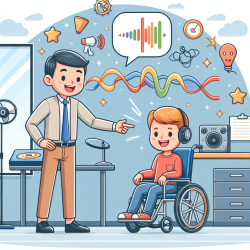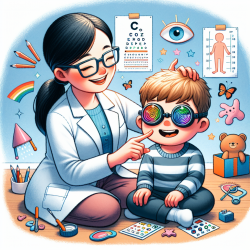In the realm of audiology and speech-language pathology, the pursuit of more efficient, reliable, and precise assessment methods is ongoing. The study "A Clinical Evaluation of an Automated Technique for Estimating Speech Reception Thresholds" by Donald G. Jamieson and Margaret F. Cheesman offers a significant leap forward in this quest. This research provides a comprehensive evaluation of an adaptive speech reception threshold (SRT) testing procedure, which could revolutionize how speech therapists assess and treat their clients. In this blog, we will explore how practitioners can implement the outcomes of this research to enhance their skills and encourage further research in their practices.
Traditional speech intelligibility testing methods, while part of the routine battery of clinical audiometric procedures, often fall short in sensitivity and efficiency. They either require considerable time to administer or are not suited to automated stimulus delivery and scoring procedures, making them less ideal for clinical use. The adaptive SRT testing procedure evaluated in the study addresses these shortcomings by using a closed set of six spondaic words as targets, with the speech signal level adjusted trial by trial using an adaptive tracking procedure. This allows for rapid determination of the SRT corresponding to the desired identification probability level.
The key advantages of implementing this adaptive SRT testing procedure in clinical settings include:
- High Efficiency: The adaptive nature of the test allows for rapid determination of SRTs, making it a time-efficient option for both clinicians and clients.
- High Reliability: The study reports extremely high test-retest reliability, indicating that the adaptive SRT testing procedure produces consistent results.
- Strong Correlation with Pure-Tone Thresholds: Adaptive SRT scores correlate well with pure-tone, air-conduction thresholds, suggesting that the adaptive SRT can serve as a reliable indicator of a client's auditory threshold.
- Potential for Automation: Response alternatives are presented on a computer monitor, and responses are recorded automatically, minimizing the potential for human error and bias.
- Flexibility in Clinical Application: The procedure's sensitivity allows for the detection of relatively small differences in performance, making it suitable for a wide range of clinical situations.
For speech therapists and audiologists, integrating the adaptive SRT testing procedure into their assessment toolkit can lead to more accurate and efficient diagnosis of hearing impairments. This, in turn, can inform more tailored and effective intervention strategies. Additionally, the automated nature of the test reduces the likelihood of human error, ensuring more reliable outcomes.
However, successful implementation of this procedure requires attention to several considerations:
- Training and Familiarization: Clinicians must be adequately trained in the use of the adaptive SRT testing procedure to ensure its effective application.
- Technological Infrastructure: Adequate technological resources, including compatible computer systems and software, are necessary to administer the test.
- Client Preparation: Clients should be oriented to the task to ensure they understand the testing procedure, which may include a brief practice session.
Encouraging further research and innovation in this area is also crucial. While the adaptive SRT testing procedure offers numerous benefits, continuous exploration and refinement can lead to even more effective assessment and treatment methodologies. Speech therapists and audiologists are encouraged to contribute to this body of research by conducting their studies, sharing insights, and developing new techniques that build upon the foundation laid by this study.
In conclusion, the adaptive SRT testing procedure represents a significant advancement in the field of speech-language pathology and audiology. By adopting this approach, practitioners can enhance their assessment capabilities, leading to better outcomes for their clients. The potential for further research and innovation in this area is vast, promising even more effective tools and techniques in the future.
To read the original research paper, please follow this link: A Clinical Evaluation of an Automated Technique for Estimating Speech Reception Thresholds.










